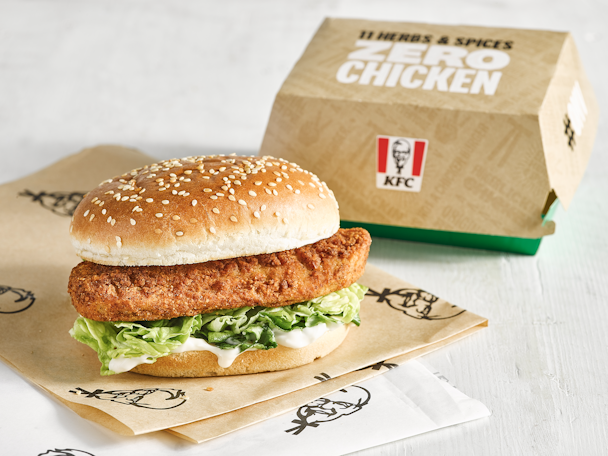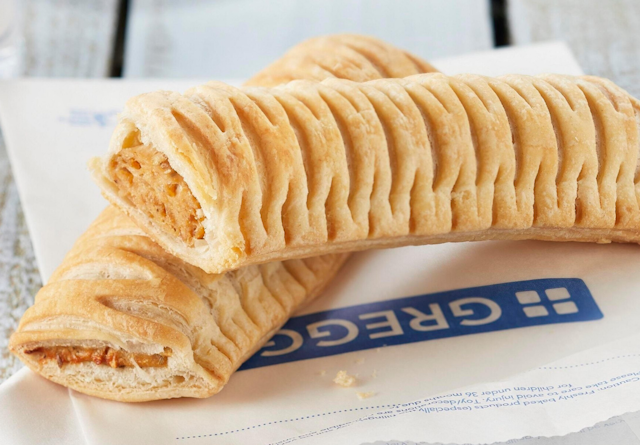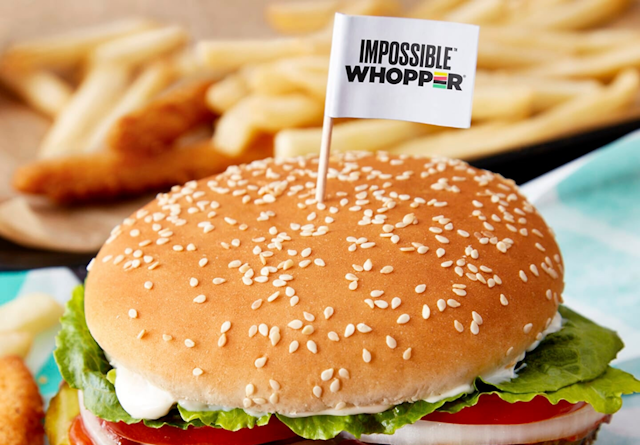
Advertisement

KFC launched its first vegan burger nationwide at the start of the year / KFC
From Rebel Whoppers to 'pepperphoni', Veganuary has seen a host of meat and diary-free products find their way on to the menus of fast-food chains around the globe. But can these businesses earnestly take a bite of the market when their core offering is still as carnivorous as ever? The Drum talks to Pizza Hut, KFC and more to find out.
When UK bakery chain Greggs launched its vegan sausage roll last year it befell the wrath of Good Morning Britain presenter Piers Morgan. The former Sun editor took issue with the eco-friendly pastry, describing execs at the high-street bakery as “PC raved clowns” and spitting out a sample live on-air. The publicity, however salty, turned out to be a gift.
In 2019, Greggs' total sales rose by 13.5% buoyed by the attention garnered from adapting its best-selling item on its menu for vegans. Sales at more established stores also rose 9.2% for the year too and the 25,000 staff the business employs are getting a £7m payout split between them in January’s pay packet as a result.
With New Year’s resolutions in full swing, those taking part in ‘Veganuary’ (the movement which encourages people to go without meat and dairy in January) will have noticed that other fast-food purveyors are following in Greggs’ footsteps.
KFC launched its first vegan burger nationwide at the start of the year – a £3.99 Quorn fillet dusted in the Colonel’s famous original-recipe coating. McDonald’s, meanwhile, has debuted vegan dippers (a spin on its popular nuggets) and Burger King plumped for a ‘Rebel Whopper’ soy patty.
In the UK alone, vegan meals are now the fastest-growing takeaway option, with orders featuring food free of animal produce growing 388% between 2016 and 2018 according to numbers from the British Takeaway campaign. The Food Standards Agency says the number of vegans in Great Britain quadrupled between 2014 and 2019 to reach 600,000 – that's 1.16% of the population.
So, it's no wonder then that fast-food restaurants are looking to take a slice of the plant-based pie.
“January used to be a month of clean eating and social hibernation. Now, it’s like Disneyland for vegans and a feeding frenzy for brands,” says Sara Collinge, managing director of PR agency Don’t Cry Wolf and co-host of the Vegan Curious podcast.
The “vegan pound”, she argues, is no joke.
“Vegan sausage rolls, toasted sarnies and (zero) chicken burgers are bringing in new audiences who want to spend their cash. Secondly, marketing teams are capitalising on seasonality – Veganuary – and the huge trend towards plant-based junk food.”
But, with their core offerings still firmly catering for carnivores, what challenges will fast-food brands face in competing in a greener, animal-friendly space.
In the US last year, KFC sold out of vegan ‘chicken’ in just five hours after trialing meat-free nuggets and boneless wings produced by Beyond Meat.
Here in the UK, its innovation team has spent the past 18 months readying its first foray into veganism, cumulating in the launch of the Original Recipe Vegan Burger, which proudly professes to contain ’11 herbs and spices, zero chicken’.
From a brand perspective, UK and Ireland marketing director Jack Hinchliffe says the brief was to go beyond appealing to the growing vegan market and design something that “looked, tasted and was as close to the chicken experience as possible”.
It even took advice from longtime critic Peta on the development of the product, and is in the process of setting up dedicated vegan-friendly prep areas across its 890 stores in the UK.
“For us it’s been about creating choice and building a menu that’s appealing to flexitarians, vegetarians and vegans,” he explains. “This isn’t just a limited edition product, it’s something that will be permanent on our menu, so we had to build it with credibility but also cut through the noise.”
Collinge agrees with Jack Hinchliffe that the strategy for fast-food brands should be focused on choice and inclusion, rather than simply catering for purist vegans.
“Vegans will seek out new high street options anyway, but there’s an army of veggies and flexitarians out there who’re looking for easy ways to eat less meat,” she says. “The demand for accessible, low cost plant-based options is there and brands have realised that vegan junk food is the gateway drug.”

As for marketing, she highlights Greggs as one of the brands getting things right.
“It knows its audience inside and out - the self-deprecating sense of humour is authentic and executed beautifully across their stunts and social. And marketing and comms runs nose to tail, from the CEO to the shop floor,” she explains.
To make its own vegan efforts stand out in a “vegan bandwagon-ladden” brand space, KFC and its agency Mother – the same creative shop responsible for those infamous ‘FCK’ press ads following the brand’s logistical poultry nightmare in 2018 – have been running a nationwide out of home and digital campaign since the start of the year.
Following internal research that found vegans and veggies miss the taste and smell of KFC, but not the chicken itself, the creative plays on KFC’s distinctive brand and bold tone of voice, pinning it around a product shot with two simple taglines ‘Finger Licking Vegan’ and ’11 Herbs and Spices, Zero Chicken’. The process wasn’t without its challenges in a low-attention economy, however.
“We had a quandary and a tightrope to walk, we couldn’t just make everything green to communicate the vegan element because that wouldn’t be leveraging KFC’s assets as distinctively as possible. But if we went really heavy on the KFC assets and the fact it’s a burger, people would have missed the vegan messaging.
“So the way we resolved it was through simple, impactful copy.”
There’s a thornier issue at play though, a vegan lifestyle and the choices informing it are directly at odds with the business models of those dipping a toe in the pool.
KFC is a company entirely built on chicken. And McDonald’s may have seen an 80% uplift in customers ordering veggie options in the past 12 months, but it still sells 75 hamburgers per-second and consumes 1.6bn pounds of beef a year resulting in around 22 million metric tons of greenhouse gas emissions. Burger King has already slipped up: in both the UK and US it's been forced to market its plant-based Whoppers towards flexitarians instead of vegans, because it cooks them on the same grill as its beef patties.

On the animal rights front, KFC, in particular, has spent years trying to tackle perceptions about its farming and production methods but this hasn’t stopped activists targeting it for the 1 billion chickens they claim are slaughtered on its behalf each year.
In 2017, the chain gained the accolade of most-complained about ad for its ‘The Whole Chicken’ ad, which featured a chicken ‘dancing’ to DMX’s X Gonna Give It To Ya. 755 viewers told the advertising watchdog that it was “disrespectful to chickens and distressing for vegetarians, vegans and children,” but the complaints were dropped without an investigation.
So, can we expect a toned-down, less chicken-y, approach to marketing as the poultry giant looks to flex its vegan credentials?
“No, not at all. We’re really proud to be all about chicken, that’s why people come to us… so even though we’re committed to the vegan space, we’re not going to be moving away from putting chicken at the heart of our communications,” says Jack Hinchliffe.
Other chains with vegan options include Frankie & Benny's, Gourmet Burger Kitchen, Nando's, Papa John's and Pizza Hut, which now offers an entirely separate vegan menu in its restaurants.
Like Greggs’ chief exec, the chain’s chief people and marketing officer Kath Austin credits its vegan credentials for having boosted sales. It’s now serving up 1400 vegan pizzas a day, an increase of 50% on last year. This January, it added a plant-based pepperoni to its range.
“From a business perspective it’s made absolute sense to think about the vegan customer. We started in 2017 looking at cheese replacements, then in 2018 we launched pizzas and we’ve now built out a full menu.”
“We haven’t found many barriers, our restaurant teams have really supported it,” she adds.
Vicky Bullen, chief of Coley Porter Bell, the branding and design agency behind M&S, Tesco and Premier Foods’ vegan ranges, acknowledges that people adopt vegan and plant-based diets for a number of reasons: some for concerns over animal welfare; others do so in an effort to address the climate emergency; others simply for the health benefits or great taste. Some for all of these reasons.
“Crucially, there is room here for fast-food brands to get involved,” she adds. “And fast-food brands have heritage in being inclusive to as many customers as possible, so it would be unthinkable that they wouldn’t aim to provide for the plant-based diet."
She acknowledges that fast-food joints will unlikely appeal to vegans concerned about animal welfare. But there is room for them to appeal to those committed to the cause about their health or the climate - "so long as they provide nutritious, delicious food and clear up their act in sustainability respectively.”
She makes a strong point: global brands like McDonald’s and KFC can still yield their influence for good and have a huge impact on reducing the amount of meat we eat, all while still selling Big Macs and Chicken Popcorn.
And maybe that’s enough food for thought for marketers and consumers alike.